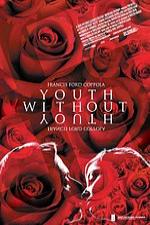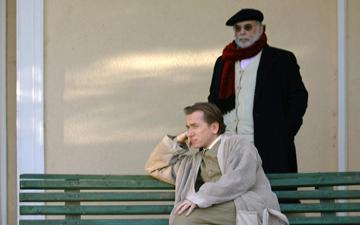
"Knight Thoughts" - exclusive web content
Director Francis Ford Coppola returns after a decade of silence with a "High Art" example of a metaphysical love story
Coppola Returns:
Youth Without Youth
12-21-07 "Knight Thoughts" web exclusive review
By Richard Knight, Jr.
Youth Without Youth
12-21-07 "Knight Thoughts" web exclusive review
By Richard Knight, Jr.
Ten years after The Rainmaker, an okay but not particularly memorable courtroom drama that introduced Matt Damon to starring
roles, director Francis Ford Coppola has returned. The picture that was brought him back is called Youth Without Youth. It's
based on a strange novella about a professor of linguistics (Tim Roth) in war torn Europe who is struck by lightning and inexplicably
regains his body of 30 years prior - along with knowledge of the future (he becomes a sort of gnomish Nostradamus). This,
naturally interests the Nazis who want to try and duplicate the miraculous feat. The professor is aided by a Doctor (Bruno Ganz) who
helps him cross into neutral Switzerland. There the professor begins to be troubled by dreams of a beautiful woman from his past
(Alexandra Maria Lara) who shows up in a reincarnated form. Before the professor can truly make sense of this, however, SHE gets
struck by lightning. Instead of gaining 30 years, she regresses thousands and speaks in an ancient tongue that it seems only
Indian scholars can decipher. The picture then goes down it's 6th or 7th rabbit hole, leading to another dead end before it veers off
in yet another direction.
What we have here is actually three films in one and Coppola, working with an amateur crew, does his best visually and aurally to
connect all the components of what boils down to a metaphysical love story. The big questions of life that the professor natters on
about are just window dressing: the lush roses of the opening credits, the sensuous music, and the creamy dream sequences
between the professor and his lost love are the things that truly interest Coppola the sensualist. When the picture fragments and
sidetracks it never really recovers and his cast isn't compelling or physically appealing enough (Roth, anyway) to hold your attention.
The opening credits, so old fashioned they seem fresh and astute, are just a tease and lure you into what is less than a failure or a
just okay movie - things Coppola has been guilty of in the past. Youth Without Youth which has moments that are beautiful and
prosaic gets so mired in complexity it becomes first incomprehensible and then, a crashing bore. Back to the vineyards.
roles, director Francis Ford Coppola has returned. The picture that was brought him back is called Youth Without Youth. It's
based on a strange novella about a professor of linguistics (Tim Roth) in war torn Europe who is struck by lightning and inexplicably
regains his body of 30 years prior - along with knowledge of the future (he becomes a sort of gnomish Nostradamus). This,
naturally interests the Nazis who want to try and duplicate the miraculous feat. The professor is aided by a Doctor (Bruno Ganz) who
helps him cross into neutral Switzerland. There the professor begins to be troubled by dreams of a beautiful woman from his past
(Alexandra Maria Lara) who shows up in a reincarnated form. Before the professor can truly make sense of this, however, SHE gets
struck by lightning. Instead of gaining 30 years, she regresses thousands and speaks in an ancient tongue that it seems only
Indian scholars can decipher. The picture then goes down it's 6th or 7th rabbit hole, leading to another dead end before it veers off
in yet another direction.
What we have here is actually three films in one and Coppola, working with an amateur crew, does his best visually and aurally to
connect all the components of what boils down to a metaphysical love story. The big questions of life that the professor natters on
about are just window dressing: the lush roses of the opening credits, the sensuous music, and the creamy dream sequences
between the professor and his lost love are the things that truly interest Coppola the sensualist. When the picture fragments and
sidetracks it never really recovers and his cast isn't compelling or physically appealing enough (Roth, anyway) to hold your attention.
The opening credits, so old fashioned they seem fresh and astute, are just a tease and lure you into what is less than a failure or a
just okay movie - things Coppola has been guilty of in the past. Youth Without Youth which has moments that are beautiful and
prosaic gets so mired in complexity it becomes first incomprehensible and then, a crashing bore. Back to the vineyards.


